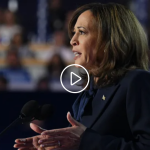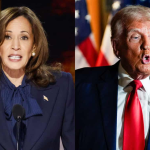The 2024 U.S. elections promise to be no different, with Democratic hopeful Kamala Harris leading the charge to find the perfect running mate. But what exactly does this vetting process entail? Let's take an in-depth look at the grueling and meticulous procedure that potential vice-presidential candidates must endure.
The Harsh Reality of the Vetting Process
Imagine undergoing a colonoscopy with a telescope. This is how one past participant described the VP vetting process. Potential candidates face a barrage of intrusive questions that dig deep into their personal lives and histories. From questions about paying for sex or abortions to inquiries about homosexual encounters, no stone is left unturned.
The Exhaustive Questionnaires
Candidates are required to answer up to 200 questions before being seriously considered. These questionnaires probe into every aspect of their lives, revealing details that even the candidates might have forgotten. The aim is to leave no room for surprises that could derail the campaign later.
The Role of Vetters
Campaign officials and lawyers, who volunteer their billable hours for networking and prestige, form the backbone of the vetting teams. These vetters have about a month to dig up every piece of dirt they can find on the candidates.
The Time Crunch
The Harris campaign has only a few days to pick a running mate, with a paperwork deadline looming. The vice-president herself, having undergone the process just four years ago, is now assessing around a dozen contenders, including Governor Josh Shapiro, Senator Mark Kelly, and Pete Buttigieg.
No FBI Background Checks
Unlike cabinet picks, the FBI does not perform background checks on vice-presidents. This makes the vetting process even more crucial as the campaign teams must ensure that nothing is missed.
Scrutiny of Personal Lives
Vetters examine everything from tax returns and medical histories to private social media accounts of the candidates and their families. The slightest hint of marital infidelity or any other skeleton in the closet is picked apart meticulously.
Confidentiality in the Vetting Process
Jim Hamilton, a Democratic lawyer who has evaluated potential running mates for several campaigns, reveals that notes from the vetting process are destroyed afterward to maintain a strict veil of confidentiality. Despite this, candidates often find themselves under intense media scrutiny.
The Experience of Evan Bayh
Evan Bayh, a finalist for Barack Obama's running mate in 2008, compares the procedure to a colonoscopy performed with a telescope. His vetting involved interviews with his entire family, and constant media attention, including TV crews camped outside his house.
The Decision-Making Process
Ultimately, the decision comes down to a handful of finalists. Bayh recalls being flown out clandestinely to meet Obama, who assured him that nothing in the vetting reports bothered him. However, Obama still asked if there was anything undisclosed that might come out later. This thoroughness is what defines the vetting process.
The Al Gore Incident
Sometimes, unexpected questions reveal potential red flags. Gary Ginsberg, who worked on the Clinton campaign, recalls Al Gore struggling to name any friends during his vetting process. This lack of a social circle raised concerns about his likability.
Historical Blunders
The vetting process has evolved due to past blunders. In 1972, Democratic nominee George McGovern picked Thomas Eagleton without a background check, only to discover that Eagleton had received electroshock treatment for clinical depression. This led to Eagleton's removal from the ticket and McGovern's eventual defeat.
The Ferraro Debacle
In 1984, Geraldine Ferraro's nomination as the first female running mate was overshadowed by her husband's financial dealings, leading to a landslide victory for Reagan. These incidents have made thorough vetting an essential part of modern campaigns.
The Palin Fiasco
In 2008, Sarah Palin dazzled during her vetting but faltered on the political stage. Her inability to answer basic questions revealed the limitations of even the most rigorous vetting processes.
The Gut Feeling
Despite thorough vetting, the final decision often comes down to the gut feeling of the presidential nominee. George HW Bush picked Dan Quayle based on his instincts, despite Quayle's perceived liabilities.
The Importance of Vetting
The vetting process is crucial in ensuring that the chosen candidates can withstand scrutiny and contribute positively to the campaign. It’s a complex, invasive, and highly confidential procedure that aims to leave no room for errors.
Conclusion
The vetting process for vice-presidential candidates is a rigorous and exhaustive procedure that leaves no detail unexamined. From probing personal questions to scrutinizing social media accounts, the process ensures that only the most resilient and scandal-free candidates make it to the final list. For political analysts, social media users, and financial experts, understanding this process offers valuable insights into the complexities of modern political campaigns.
As we approach the 2024 U.S. elections, the importance of thorough vetting cannot be overstated. It is a critical step in ensuring that the chosen candidates can withstand the intense scrutiny and pressures that come with running for one of the highest offices in the land. For those interested in exploring more about this fascinating aspect of political campaigns, numerous resources are available online, offering deeper dives into the intricate world of VP vetting.
In the end, the vetting process is about more than just finding a suitable running mate; it’s about safeguarding the integrity of the political system and ensuring that the candidates who reach the top are truly worthy of the trust and responsibility placed in them by the American people.
For more insights and detailed analysis on the vetting process and other political topics, stay tuned to our blog and join our community of informed citizens and experts. Together, we can better understand and engage with the political processes that shape our world.







